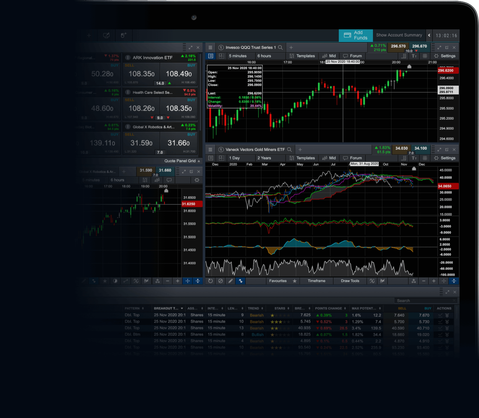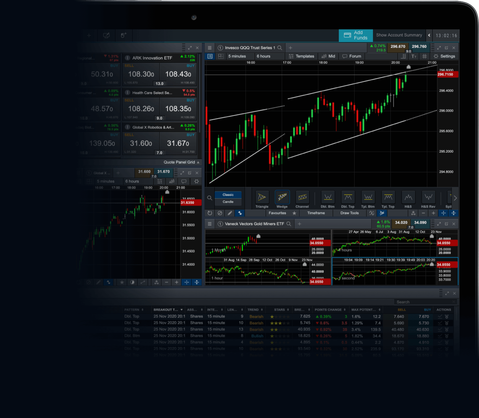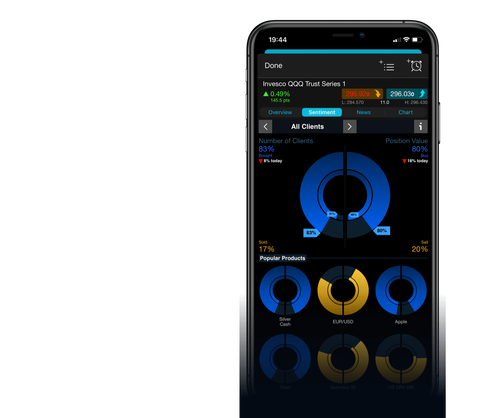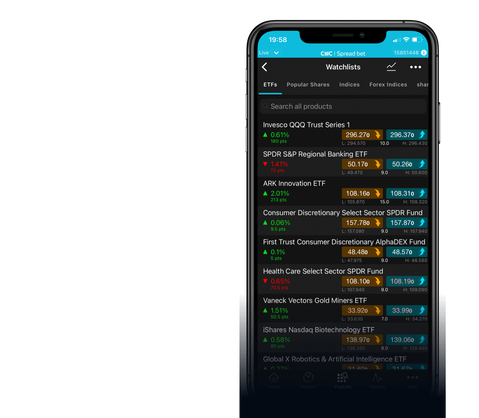ETF trading
Trade on over 1,000 exchange-traded funds with leverage on our award-winning spread betting and CFD platform1. Enjoy tight spreads, lightning-fast execution2 and dedicated customer support, 24/5.
View popular ETFs
1Y
Pricing is indicative. Past performance is not a reliable indicator of future results.
More than just an ETF trading platform
Your favourites in one place
Over 1,000 global ETFs to trade, including the most popular themes from the US and Europe.
Professional research
Free access to quantitative equity analysis from Morningstar3.
Minimal slippage
With fully automated, lightning-fast execution in 0.0040 seconds2.
No partial fills
And no dealer intervention, regardless of your trading size.
24/5 customer support
Our experienced client service team are available around the clock from Sunday night through to Friday evening.
Competitive pricing
Enjoy tight spreads across our full range of ETF instruments.
What are ETFs?
Trading ETFs enables investors to obtain instant diversification, by gaining exposure to a range of instruments across a sector, or within the S&P 500 or Russell 3000 index for example, with a single transaction.
ETFs can be classified into three major fund types, typically based on specific investment characteristics. These are passive, smart beta and actively managed (including semi-transparent ETFs). The difference between each type of fund is the investment strategy underpinning it. For instance, index investing uses a strategy that requires little involvement, as these funds are set up to mimic the performance of a broad market index, such as the FTSE 100 or S&P 500. These are passively-managed funds. An actively-managed fund, on the other hand, will have its holdings readjusted and reallocated on a frequent basis by portfolio managers in an attempt to outperform the benchmark index.
Our themes to watch
Since their establishment three decades ago, exchange-traded funds (ETFs) have evolved from a relatively obscure investment fund to a type of investment vehicle that has attracted trillions of dollars worth of assets. But with thousands of available instruments and multiple types and focuses, how do you know where to start? Our in-house trading team have identified three themes with high growth potential and the instruments well placed to benefit from their performance.
Other popular instruments
Pricing is indicative. Past performance is not a reliable indicator of future results.
See our ETF costs
Whatever you trade, costs matter. That’s why we’re committed to bringing competitive pricing across all of our markets, whether you trade on ETFs, indices or commodities.
^When trading share CFDs on our platform a commission will be charged upon execution of any order. Minimum commission charges may apply.
^^The minimum commission that is payable to trade a share CFD and one of the costs associated with trading a share CFD.




The platform built for ETF trading
Fast execution2, exclusive insights and accurate signals are vital to your success as an ETFs trader. Our award-winning trading platform was built with the successful ETFs trader in mind.
Industry-leading charting1
Analyse the markets with our wide selection of over 115 indicators and drawing tools, 70 chart patterns and 12 chart types.
Pattern recognition scanner
We automatically scan over 120 of our most popular instruments every 15 minutes for emerging and completed chart patterns, such as wedges, channels and head & shoulders formations to give you a head start on the market.
Client sentiment
Award-winning app1
FAQs
New to CMC Markets?
Is it free to open an account?
There's no cost when opening a live spread betting or CFD trading account. You can also view prices and use tools such as charts, Reuters news or Morningstar quantitative equity reports, free of charge. However, you will need to deposit funds in your account to place a trade. Learn about the costs involved in spread betting and CFD trading
What are the costs of trading on forex?
There are a number of costs to consider when spread betting and CFD trading, including spread costs, holding costs (for trades held overnight which is essentially a fee for the funds you borrow to cover the leveraged portion of the trade), rollover costs for expired forward trades, and guaranteed stop-loss order charges (if you use this risk-management tool).
Is CMC Markets regulated?
CMC Markets Germany GmbH is a company authorized and regulated by the German Federal Financial Supervisory Authority (BaFin) under registration number 154814. CMC Markets meets the requirements of Section 84 of the German Securities Trading Act (WpHG) with regard to customer funds. It keeps retail client funds separate from its own funds in segregated bank accounts.
How does CMC Markets protect client funds?
CMC Markets Germany GmbH is a company authorized and regulated by the Federal Financial Supervisory Authority (BaFin). CMC Markets meets the requirements of Section 84 of the German Securities Trading Act (WpHG) with regard to customer funds. It keeps retail client funds separate from its own funds in segregated bank accounts. In the unlikely event that CMC Markets Germany GmbH is unable to meet its financial obligations, the EdW would cover up to 90% of the receivables from transactions (maximum EUR 20,000) provided certain criteria are met.
How does CMC Markets make its money?
Our income comes primarily from our spreads and commissions, while other charges - such as overnight holding costs - make a small contribution to our total revenue.
New to ETF trading?
What is leveraged ETF trading?
As an example, let’s say you want to put down a total of £1,000 on your ETF trade. Due to the leverage available with spread betting (5:1 in this case), you would be able to enter this position with an initial outlay of £200, instead of £1,000. However, remember that your profits and losses are based on the full value of the trade (£1,000). As a retail client, you will never lose more than the amount in your account. One of the advantages of spread betting and CFD trading is that you only need to deposit a percentage of the full value of your position to open a trade, known as trading on leverage. Remember, trading ETFs on leverage can also amplify losses, so it’s important to manage your risk.
How does spread betting and CFD trading ETFs actually work?
When you spread bet or trade CFDs on ETFs on our platform, you don’t buy or sell the underlying ETF. Instead, you’re taking a position on whether you think the ETF price will go up or down. With spread betting, you buy or sell an amount per point movement for the instrument you are trading, such as £5 per point. This is known as your stake. With CFD trading, you buy or sell a number of units for a particular instrument. For every point or unit that the price moves in your favour, you gain multiples of your stake, and vice versa.
What are the costs involved in ETF trading?
There are a number of costs to consider when trading on ETFs, including spread costs, holding costs (for trades held overnight) and guaranteed stop-loss order charges (if you use this risk-management tool). See our trading costs.
